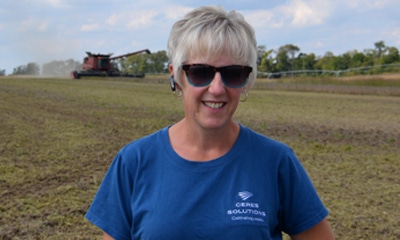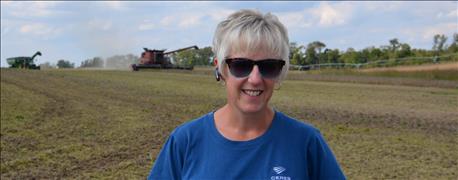
Betsy Smith works with several farmers who irrigate crops in west-central Indiana. Smith, an agronomist with Ceres Solutions and an Indiana Certified Crop Adviser, says even late in the growing season, a crop might benefit from more irrigation. It depends upon the crop’s stage of development, soil type and current soil moisture conditions.
Smith provides these facts and tips to help make the decision about how long to irrigate.
— Corn at beginning dent stage still needs 5 inches of soil water to finish the crop.
— At beginning dent stage, most hybrids remove 0.2 inch of water per acre per day. In some years and on some soils, it’s difficult for the soil to meet those requirements

DON’T QUIT TOO SOON: Betsy Smith advises understanding how much water crops use late in the season before deciding when to stop irrigating.
— Corn removes moisture from the soil until kernels reach black layer.
— Stop irrigating when corn reaches black layer, but not before if moisture is needed. Black layer is considered the point of physiological maturity for corn.
— Watch the milk line on the grain to get a handle on it. You may need to waste a few ears to gauge the crop's overall stage of development.
— At beginning dent stage, it’s usually about three weeks to maturity, give or take, depending on hybrid.
— At one-half milk line in the kernels, it’s about two weeks to maturity, give or take.
— At one-half milk line in the kernels, plants still need about 2.25 inches of moisture in the soil profile to finish producing kernels properly.
— Once the black layer forms at the tip of the kernel, it won’t take up any more water or nitrogen.
— Soil moisture probes can be helpful in enabling you to do a better job of irrigating.
— Soybeans actually need more water later in the season than corn needs during the same period.
Your goal should be knowing when to water, how much water to apply and where roots are pulling soil moisture from in the profile, Smith concludes.
About the Author(s)
You May Also Like




